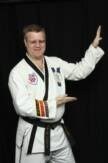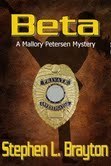Author Interview with Stephen L. Brayton
 I'm a Fifth Degree Black Beltinstructor in the American Taekwondo Association. I started martial artstraining in 1991, earned my black belt in 1993, and gained my instructorcertification in 1995.
I'm a Fifth Degree Black Beltinstructor in the American Taekwondo Association. I started martial artstraining in 1991, earned my black belt in 1993, and gained my instructorcertification in 1995.In 1996, I opened up my firsttaekwondo club in Grinnell, Iowa.
In 2003, I assumed ownership of theclub in Oskaloosa, Iowa.
I've written stories for many years,but started seriously while working at a radio station in Kewanee, Illinois. After Imoved to Oskaloosa, Iowa, I startedattending a writers' group in Des Moines. So much knowledgeabout writing and critique came out of thatgroup and the others I've enjoyed.
I attended my first conference in2007, Love Is Murder, In Chicago. Mike Manno introduced me to'pitches' and we discussed writing and history and law while sharing the drive.
In 2009, while attending the KillerNashville conference I was fortunate enough to meet Mary Welk of Echelon Press.Subsequent to the conference I submitted two novels to Echelon and in October,they BOTH were accepted for E-publication in 2011.
I'm a reader; a writer; an instructor;a graphic designer; a lover of books, movies, wine, women, music, fine food,good humor, sunny summer days spent hiking or fishing; and I'm a catnip drugdealer to my fifteen pound cat, Thomas.
Tell us about "Beta"in a few sentences.
 Mallory Petersen is aprivate investigator and martial artist. Her clients usually lean toward thenuttier side, however when she accepts a case to find a kidnapped eight yearold, she steps into a dark world of unspeakable crimes. The trail leads heraround Iowa's capital city of Des Moines to the Quad Cities.
Mallory Petersen is aprivate investigator and martial artist. Her clients usually lean toward thenuttier side, however when she accepts a case to find a kidnapped eight yearold, she steps into a dark world of unspeakable crimes. The trail leads heraround Iowa's capital city of Des Moines to the Quad Cities.Where and when is yournovel set and why did you make these specific choices?
I've based it out ofDes Moines mainly because I'm familiar with the metropolitan area. I've neverbeen to New York or Los Angeles and could get lost in Chicago quite easily. Idon't know of any book where Des Moines has been featured. It's also set inpresent day, although I don't say which present day (if that makes any sense).I started this over ten years ago and since then, the Des Moines downtownlandscape has changed and technology has changed. I kept making changes in mystory to fit the current scene. However, I finally had to stop and go with whatI had. So, some of the places I mention in the book don't exist any longer.
How can people buyyour books?
You may purchase thisand the previous book at Amazon, Barnes & Noble, and OmniLit.com.
How do you set aboutwriting a piece?
Normally, an idea willcome to me at any given moment. I may write it down or I may contemplate it forawhile. If it won't leave me alone, I may start jotting notes, interestingscenes, maybe a few characters. If it bugs me enough I'll work on an outlineand write a few research questions I'll need to check out later. Then I'lldevelop a few characters (names, descriptions, etc.). Once I have a startingbasis, then I can begin with the prologue or the first chapter.
Beginning writers makemany mistakes; what do you think is the most harmful?
They stop writing.They don't believe in themselves. I read a statistic that 80% of Americanswould like to write a novel. Well, why don't they? Many do not take the ideaseriously. Many stop after receiving critiques. Most critiques are given byother struggling writers, those who are also learning the craft. However,beginners think their stuff is crap and do you want to know the truth? Itprobably is. Everybody writes crap. I'm sure Stephen King, Ernest Hemmingway,and Shakespeare all wrote crap when they first started writing. But they had adream, they learned, they honed their talent, they persevered and they believedin themselves. Don't stop writing.
To what extent aregrammar and spelling important to a writer?
What good are playingor singing the correct notes to a musician? What good is having good rhythm toa dancer? The right tools for a plumber or a carpenter? If a hockey playercan't skate, then he doesn't play the sport. Spelling? Come on, every word processingsoftware has a spell checker. Don't tell me dictionaries suddenly havedisappeared. Grammar? Most of us do notwrite like we speak. Many Americans are lazy talkers. If you're a writer,though, you'd better have learned something in those English classes becauseeditors will nail you on the fundamentals.
How much revision ofyour MS do you do before you send it off?
When I write END, Istop writing the story. Then I celebrate that I've completed the task I had setbefore me. I may take a break, allow a few days to pass, then I will start atpage one and read through the entire story, making corrections on dialogue, punctuation,grammar, continuity errors, etc. Then I'll read through it again. And again. Idon't keep track of the number of times. After I get sick of looking at themanuscript, I'll put it aside for awhile and work on another project. I maystill be reading parts of it to a critique group, but I don't actively work onit. Then after a period of time passes, I'll pick it up with fresh, relaxedeyes and reread again. I know, though, no matter how many times I go throughit, some editor will pick it apart and find those errors I still missed.
Do you have support,either from family and friends or a writing group?
I have a couple ofreally close writer friends. We try to meet weekly although the plan doesn'twork out all of the time. We're all working on getting published either againor for the first time. Critique groups are invaluable and if you're not part ofone, you are missing out on free but priceless advice. And a whole lot of fun.Family? Wow, my family has supported me and encouraged my writing for years.When I was accepted by Echelon Press for my first two books, I called my Dadbefore I even replied to Echelon's email.
Is there any aspect ofwriting that you really enjoy?
The research. I envythose authors who can create entire cities or worlds or people from nothingmore than their thoughts. If I'm writing about a building, or a park, or acemetery, I have to see it. I want to talk to people, ask questions. It's funbecause I've discovered little things I may not have known about if I hadn't traveledto those places or talk to those people. Often, the little things end up in thestory. I turn real people into fictional characters and include minor tidbitsabout a particular neighborhood. For instance, while looking at spots aroundDes Moines for a future book, getting lost and confused on directions, a friendand I discovered a Buddhist temple right in the middle of a residential area.Neither of us knew the place existed. It was a beautiful site. You just knowthat building is going to end up in a story somehow. What are you writingnow?
I've completed thesequel to Beta and am working on the sequel to my first book, Night Shadows.I'm also writing another private detective story I plan to finish this year aswell as a obtaining more research to continue on a thriller.
Do you have a websiteor a blog that readers can visit?
My website is www.stephenbrayton.com . My blog where I do author interviews and post writing related stuff is www.stephenlbrayton.blogspot.com . My book review blogis www.braytonsbookbuzz.blogspot.com .
Given unlimitedresources, what would be your ideal writing environment?
Awesome question. I'dlike to give you an exotic place I could be, like Fiji or France or Tibet, butI don't think I'd end up writing there. I'd want to explore. Ideally, thoughI'd love to write where I could have no distractions from the Internet, email,phone, or people stopping by for a visit, with an ample supply of food, and astation playing continuous, no commercials classical, jazz, or light pop.
Where do you actuallywrite?
Usually at work (don'ttell the boss, though, okay?). Sometimes in the park, maybe a coffee shop.

Published on October 06, 2011 05:00
No comments have been added yet.



